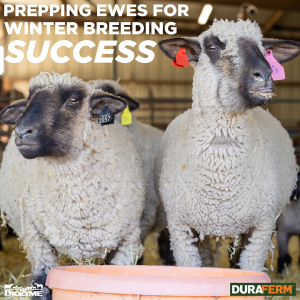
Spring and summer temperatures are not far away. With a mild winter and above-average temperatures, you will want to begin thinking about ways to keep your goat herd cool to help prevent heat stress in your goats.
What is Heat Stress?
Heat stress occurs when there is an imbalance between metabolic heat production inside the animal’s body and its dissipation to the surroundings under high air temperature and humid climates. Humidity plays into heat stress as much as heat. Let’s examine the signs of heat stress in goats.
Heat stress in goats can lead to various signs and symptoms, indicating that the animal is struggling to regulate its body temperature effectively in hot and humid conditions. Recognizing these signs promptly is crucial for implementing interventions to alleviate heat stress and prevent adverse health outcomes.
Common Signs of Heat Stress in Goats
Excessive Panting, Salivation and Drooling
Panting is a primary mechanism for goats to dissipate heat and regulate body temperature. Heat-stressed goats may exhibit rapid or labored breathing, open-mouth breathing and excessive panting as they attempt to cool down.
Heat-stressed goats might also show increased salivation or drooling, which can be a sign of discomfort and elevated body temperature. Excessive salivation may occur as the goat attempts to cool down and maintain hydration.
Increased Respiration Rate
Heat-stressed goats may have elevated respiratory rates compared to normal conditions. The respiratory rate may be noticeably faster and shallower as the goat’s body attempts to expel excess heat through respiration.
Decreased Feed Intake
Heat stress in goats can suppress appetite and reduce feed consumption. Heat-stressed goats may show disinterest in grazing or eating, leading to decreased feed intake and potential nutritional deficiencies.
Dehydration
Heat stress can lead to dehydration in goats, characterized by dry mucous membranes, sunken eyes, and reduced skin elasticity. Dehydrated goats may appear lethargic, weak and listless, and they may have dark-colored urine.
Reduced Activity, Seeking Shade and Ventilation
Goats experiencing heat stress might become lethargic and show decreased activity levels. They may prefer lying down in shaded areas rather than grazing or moving around. Reduced activity is a common response to conserve energy and minimize heat production.
Goats that are overheated may actively seek out shaded areas or locations with better ventilation to escape the heat. They may gather under trees, in barns, or near fans or breezy areas in an attempt to cool down.
Elevated Body Temperature
Monitoring rectal temperature can help determine the severity of heat stress in goats. An elevated body temperature above the normal range (around 101.5°F to 103.5°F or 38.6°C to 39.7°C) indicates heat stress and may merit immediate intervention.
Signs of Distress
Heat-stressed goats may exhibit signs of distress, such as restlessness, agitation or vocalization. They may display signs of discomfort, including pawing at the ground, rubbing against objects or exhibiting abnormal behaviors.
Increased Susceptibility to Health Issues
Prolonged heat stress in goats can weaken the immune system and increase your herd’s susceptibility to health challenges. This increases their risk of heatstroke, dehydration, metabolic disorders and respiratory infections.
It is essential to monitor goats closely for signs of heat stress during hot weather conditions and take proactive measures to prevent and alleviate heat-related complications. Let’s explore X ways to alleviate heat stress in your herd.
Heat Stroke Preventative Measures
Preventing heat stroke in goats requires proactive management practices and environmental modifications to help them cope with hot and humid conditions. Here are 7 strategies to prevent heat stroke in goats:
1. Provide Adequate Shade & Proper Ventilation
Ensure that goats have access to shaded areas throughout the day, especially during the hottest hours. Provide natural shade from trees, shelters or constructed shade structures to allow goats to escape direct sunlight and heat.
Improve airflow and ventilation in goat housing facilities, such as barns, sheds and pens, to promote air circulation and cooling. Install fans, vents or open windows to facilitate the movement of air and reduce heat buildup in enclosed spaces.
2. Offer Clean, Fresh Water; Provide Electrolytes
Ensure that goats have access to clean, fresh water at all times to help them stay hydrated and regulate body temperature. Monitor water availability and cleanliness regularly, especially during hot weather, and consider installing multiple water sources to prevent overcrowding and competition.
Supplement goats with electrolytes during periods of heat stress to replace lost minerals and maintain electrolyte balance. Offer electrolyte solutions in drinking water or incorporate electrolyte supplements into the feed to support hydration and electrolyte status.
3. Adjust Feeding Practices
Modify feeding schedules and rations during hot weather to minimize metabolic heat production and digestive heat load in goats. Offer high-quality forage and consider feeding during cooler times of the day, such as early morning or late evening, to reduce heat stress in goats.
4. Minimize Stress and Handling
Minimize handling, transportation and other stressors during periods of heat stress to reduce the risk of heat-related complications in goats. Handle goats calmly and gently to minimize stress and exertion during management activities.
5. Provide Cooling Measures
Implement evaporative cooling methods, such as wetting goats with water or using misting systems, to facilitate heat dissipation and lower body temperature. Allow goats to wade or soak in shallow water troughs or pools to cool off during hot weather.
6. Implement Grazing Management
Rotate goats to fresh pastures with ample forage and vegetation to reduce heat exposure and provide opportunities for grazing in cooler environments. Monitor pasture conditions and adjust stocking rates to prevent overgrazing and maintain pasture quality.
7. Monitor Behavior and Health
Keep a close eye on goat behavior and health during hot weather conditions. Watch for signs of heat like those we outlined above. Act promptly if signs of distress are observed and provide immediate relief and veterinary attention if necessary.
By implementing these preventive measures and maintaining a proactive approach to goat management, producers can help minimize the risk of heat stroke and promote the health, comfort and well-being of their goats during hot weather conditions.
BioZyme® Can Help
Did you know that 70% of the immune response is found in the digestive system? If your goat herd starts healthy, it is going to be easier for them to stay cool and keep cool. Include DuraFerm® in your goat’s diet to keep them healthy.
DuraFerm is a line of nutritional supplements for sheep and goats that supports optimal digestion and nutrition for maximized performance at every stage of production. Powered by AO-Biotics® Amaferm®, a prebiotic research-proven to enhance digestibility, your goats will remain cooler because their digestibility is increased.
Another option you can provide your goats is Sure Champ Liquid Boost with Vita Charge® technology. Although not technically an electrolyte, Liquid Boost is a liquid for all livestock designed to provide immediate support to the animal’s digestive and immune system. Formerly known as Vita Charge Liquid Boost, it contains AO-Biotics® Amaferm®, a prebiotic research-proven to enhance digestibility and MOS (mannan oligosaccharides) to help normalize gut microflora and support the immune system. It also contains flavoring to help drive intake of feed or water, of upmost importance when goats are experiencing heat stress.
The Vita Charge Technology contains a unique blend of ingredients to help support animal health before, during or after the stress response. Every product with Vita Charge Technology contains an exact amount of B vitamins, vitamin E, potassium, zinc, MOS and Amaferm. In addition, a precisely defined salt to sugar ratio ensures your animal’s hydration. This combination provides undeniable impact to livestock under stress, embodying BioZyme’s overall purpose to provide “care that comes full circle.”
Get your BioZyme Products Today
We don’t want you to stress about your goats and heat stress. Be proactive and keep your herd cool and healthy with these products we’ve described from BioZyme.
Get your DuraFerm or Liquid Boost from a dealer near you. Find a dealer closest to you by using our dealer locator.
Perhaps you want to buy it online. You certainly can!
Want more information about DuraFerm or raising a healthy herd? Visit us online.

